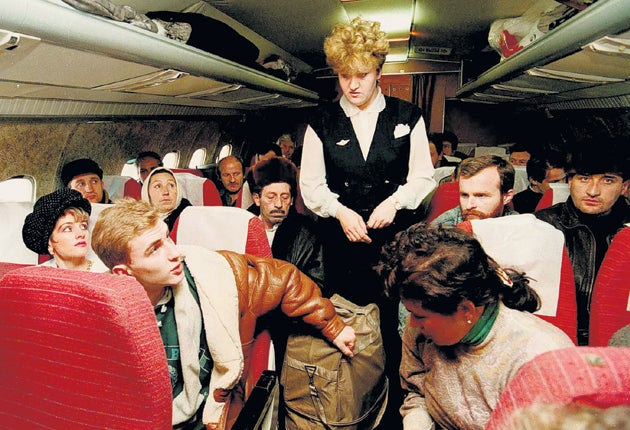Move over Virgin – now Aeroflot is upgrading its air hostesses

Your support helps us to tell the story
From reproductive rights to climate change to Big Tech, The Independent is on the ground when the story is developing. Whether it's investigating the financials of Elon Musk's pro-Trump PAC or producing our latest documentary, 'The A Word', which shines a light on the American women fighting for reproductive rights, we know how important it is to parse out the facts from the messaging.
At such a critical moment in US history, we need reporters on the ground. Your donation allows us to keep sending journalists to speak to both sides of the story.
The Independent is trusted by Americans across the entire political spectrum. And unlike many other quality news outlets, we choose not to lock Americans out of our reporting and analysis with paywalls. We believe quality journalism should be available to everyone, paid for by those who can afford it.
Your support makes all the difference.Mention the name Aeroflot and most Western travellers will recoil in horror, conjuring up images of rusting Soviet planes, appalling service, inedible food and a service ethos reminiscent of the days when collectivism trumped consumer culture in the USSR.
Now the airline is trying to address that image problem, and yesterday it announced plans to renew its fleet, improve its service and generally turn over a new leaf. Unfortunately, alongside those laudable 21st-century goals, the company's management made another commitment that plunged it right back into the worst 1970s stereotypes of airline priorities: a promise to pamper passengers with a new generation of stewardesses who would be easier on the eye.
The new Aeroflot CEO Vitaly Savelyev said all new stewardesses would be "very striking, very eye-catching girls", who would not exceed Russian size 48 – roughly a British size 12.
The airline also announced a change in the blue-and-orange uniforms. "Psychologists have told us that the current colour evokes revulsion in passengers," Mr Savelyev told the newspaper Vedomosti. "We've looked at the uniforms of other major carriers. My son sent me a wonderful video clip of Virgin Atlantic – all of their stewardesses are in bright red uniforms and look like professional models." A competition has been held among 40 design agencies to decide on a new uniform.
As part of the retraining, a number of Aeroflot hostesses have been sent to Singapore to receive training from Singapore Airlines. "The passenger is always right!" said Mr Savelyev, voicing a concept that often seems to be alien to Russian flight crews. "We have fired a lot of stewardesses for being rude to passengers," he admitted.
The airline also plans to drop almost all its Russian-made aircraft, including 26 Tupolev 154 jets, which are mostly used on routes within Russia and to non-European destinations. The planes, many of which are old, also suffer from design faults. Aeroflot insists it is changing Tupolevs for Boeings and Airbuses not because of safety concerns, but because the Russian planes are less fuel-efficient.
Travellers report mixed experiences on Aeroflot, with reasonable service and new planes on flights to western Europe and the US, but horror stories about flights to other destinations. "On flights to London the service is okay," said a British accountant working in Moscow. "But I recently flew Aeroflot to Warsaw, and it was a nightmare. The seatbelt on my chair was broken, the crew were rude and spoke virtually no English, and the only meal option was an unspecified 'meat'. When I asked what kind of meat it was, they simply shrugged."
Last December, a passenger revolt stopped an Aeroflot plane taking off in Moscow after the pilot had come onto the Tannoy sounding blind drunk. Passengers claimed an airline spokesman told them it "wasn't a big deal" if the pilot was drunk as the plane would fly itself anyway". The take-off was only aborted after a well-known TV presenter sitting in business class made some high-level phonecalls. Aeroflot denied the pilot had been drunk, and blamed "mass psychosis" among the passengers, but it is incidents like this which have led the airline to hire Western PR firms to boost their image. Whether the latest move to sex up the staff will have the desired effect remains to be seen.
Glamour in the skies
The legend of aerial misogyny was born in the 1960s and '70s, when airlines would routinely use the glamour of their air hostesses as a selling point. Many airlines had "no-marriage" rules for their female staff. "Being beautiful isn't enough," American Airlines proudly said. "We don't mean it isn't important. It just isn't enough." Meanwhile, the now-defunct National Airlines ran a series of ads with a pouting stewardess proclaiming: "I'm Mandy. Fly Me." As the world moved on, the term "air hostess" was replaced with the gender neutral "flight attendant". But recently some suspect sexism has crept back into the industry's advertising. Virgin drew 29 complaints over an ad campaign in which passengers gawped at a glamorous all-female flight-crew. Ryanair even published an all-female calendar of its flight attendants – wearing bikinis.
Join our commenting forum
Join thought-provoking conversations, follow other Independent readers and see their replies
Comments